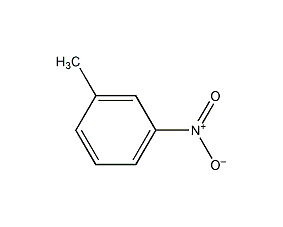
Structural formula
| Business number | 02F6 |
|---|---|
| Molecular formula | C7H7NO2 |
| Molecular weight | 137 |
| label |
3-nitrotoluene, 1-Methyl-3-nitrobenzene, m-methylnitrobenzene, 3-Nitrotoluene, 1-Methyl-3-mitrobenzene, 3-Methylnitrobenzene, Pesticide intermediates; aromatic nitrogen-containing compounds and their derivatives |
Numbering system
CAS number:99-08-1
MDL number:MFCD00007265
EINECS number:202-728-6
RTECS number:XT2975000
BRN number:1906910
PubChem number:24897588
Physical property data
1. Properties: yellow liquid or crystal[1]
2. Melting point (℃): 15.1[2]
3. Boiling point (℃): 231.9[3]
4. Relative density (water=1): 1.16[4]
5. Relative vapor density (air=1): 4.72[5]
6. Saturated vapor pressure (kPa): 0.13 (50.2℃)[6]
7. Critical pressure (MPa): 3.8[7]
8. Octanol/water partition coefficient :2.4~2.45[8]
9. Flash point (℃): 101.67[9]
10. Ignition temperature (℃): 305[10]
11. Explosion upper limit (%): No data available
12. Explosion lower limit (%): 1.6[11]
13. Solubility: insoluble in water, soluble in benzene, miscible in ethanol and ether. [12]
Toxicological data
1. Acute toxicity[13]
LD50: 1072mg/kg (rat oral)
LC50 : 693mg/m3 (rat inhalation)
2. Irritation No information available
Ecological data
1. Ecotoxicity[14]
LC50: 33.14mg/L (96h) (zebrafish); 71mg/L (48h) ) (Medaka); 7.5mg/L (48h) (Daphnia)
EC50: 14mg/L (96h) (Single-cell green algae)
2. Biodegradability [15] MITI-I test, initial concentration 100ppm, sludge concentration 30ppm, 2% degradation after 14 days.
3. Non-biodegradability No information available
Molecular structure data
1. Molar refractive index: 37.62
2. Molar volume (cm3/mol): 117.5
3. Isotonic specific volume (90.2K ): 300.4
4. Surface tension (dyne/cm): 42.6
5. Dielectric constant:
6. Dipole moment (10-24cm3):
7. Polarizability: 14.91
Compute chemical data
1. Reference value for hydrophobic parameter calculation (XlogP): 2.4
2. Number of hydrogen bond donors: 0
3. Number of hydrogen bond acceptors: 2
4. Number of rotatable chemical bonds: 0
5. Number of tautomers:
6. Topological molecular extremes��Surface area (TPSA): 43.1
7. Number of heavy atoms: 10
8. Surface charge: 0
9. Complexity: 130
p>
10. Number of isotope atoms: 0
11. Number of determined atomic stereocenters: 0
12. Number of uncertain atomic stereocenters: 0
13. The number of determined stereocenters of chemical bonds: 0
14. The number of uncertain stereocenters of chemical bonds: 0
15. The number of covalent bond units: 1
Properties and stability
1. Stability[16] Stable
2. Incompatible substances[17] Strong oxidizing agent, strong reducing agent, strong alkali
3. Conditions to avoid contact[18] Heating
4. Polymerization hazard[19] No polymerization
5. Decomposition products[20] Nitrogen oxides
Storage method
Storage Precautions[21] Store in a cool, ventilated warehouse. Keep away from fire and heat sources. The storage temperature does not exceed 35°C and the relative humidity does not exceed 80%. The packaging is sealed. They should be stored separately from oxidants, reducing agents, alkalis, and food chemicals, and avoid mixed storage. Equipped with the appropriate variety and quantity of fire equipment. Suitable materials should be available in the storage area to contain spills.
Synthesis method
In the industrial production of o-nitrotoluene and p-nitrotoluene, m-nitrotoluene can be recovered at the same time. m-nitrotoluene can be prepared from 3-nitro-4-aminotoluene through the following process, with a yield of about 67%.

Purpose
1. Used to prepare naphthol AS-BS and m-nitrobenzoic acid. It is also used in pesticides, medicines, color developers, plastic and synthetic fiber additives, etc.
2. Used in organic synthesis. [22]

 微信扫一扫打赏
微信扫一扫打赏

